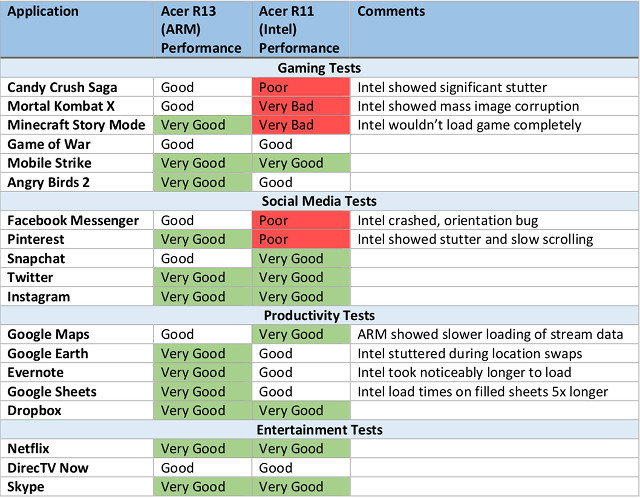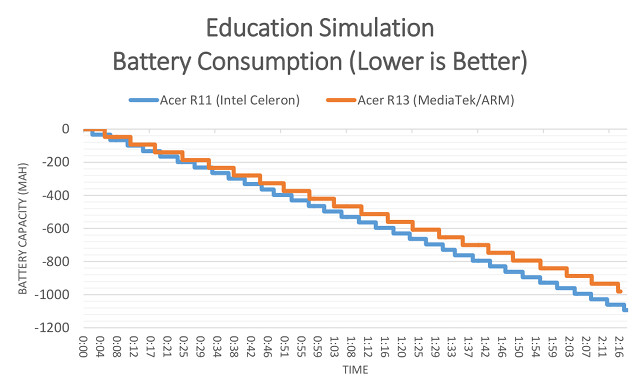Google has been working on supporting Android apps and the Play Store on Chromebooks, which are normally sold with either ARM or Intel processors. So the ability to run Android apps well is one of the things to consider before purchasing a Chromebook. Shrout Research has published a paper entitled “Chromebook Platform Choice Important for Android App Performance” comparing an Acer Chromebook R13 with a Mediatek MT8173C ARM Cortex A72/A53 processor to Acer Chromebook R11 with an Intel Celeron N3060.

The Intel Chromebook has a smaller resolution so this could be an advantage, so less resources are needed to update the display. However, the ARM processor is significantly more powerful than the Intel one according to GeekBench results, and Chromebook R13 is sold for $399 on Amazon US, while Chromebook R11 goes for $299 (and lower during promotions). So it’s not a perfect comparison, but it should give an idea especially when it comes to app stability.

The ARM Chromebook can run Android apps “well” (only minor issues) and “very well”, while the Intel Chromebook also did a good job for entertainment and productivity apps, but performed unreliably, and in some cases very poorly with some social media apps, and games. Since most mobile phones are based on ARM, developers spent more time optimization code for the platform. Some performance issues may also be partially due to different CPU and GPU performance, but the study did not address this at all, except when saying R11 screen resolution was lower.

The research company also ran “education simulation” in both Chromebooks, not using Android apps, but instead various website and apps in the web browser such as Edmodo, Google Docs, Solar Explorer, etc… and found out the Intel chromebooks was depleting the battery faster with the ARM Chromebook uses 11.5% less power.
One last point shown in the disclaimer at the end of the paper:
This paper was commissioned by ARM Holdings. All testing, evaluation and analysis was performed in-house by Shrout Research and its contractors. Shrout Research provides consulting and research services for many companies in the technology field, other of which are mentioned in this work

Jean-Luc started CNX Software in 2010 as a part-time endeavor, before quitting his job as a software engineering manager, and starting to write daily news, and reviews full time later in 2011.
Support CNX Software! Donate via cryptocurrencies, become a Patron on Patreon, or purchase goods on Amazon or Aliexpress





AFAIK, those results are not surprising – both Acer Chromebook R13 and Samsung Chromebook Plus have been known to perform better with Android apps than their intel counterparts.
Not sure what the point of this article is…The main reason why Samsung has been waiting to release the pro is waiting for app optimization.. once things are completed the intel cpu will be superior in almost every way.. try properly multitasking on an arm Vs a optimised app on an Intel…
@Plip
The purpose of this article is to show people that, as before on tablets, choosing an Intel chip if you want to run Android Apps may not be the best idea. Most stuff should run out of the box but, given that Intel has quit the tablet and phone market, there is almost zero incentive for programmers to ship x86 native code with apps. This will lead to both compatibility problems and slower execution on code running on ART.
The biggest issue in the Chromebook ARM ecosystem, right now, is that they are not shipping modern cores in them. If we were already shipping dual and quad A73 chips, things would be very, very interesting, as the cores are much faster than both A72 and Goldmont (Apollo Lake).
Nice! I’ve been saying this in comments on chromeunboxed for months, Android support in Chrome OS means the death of x86. Finally. But this will only happen if Google supports Android better on Chrome OS, integrates functionality better in the UI, and if manufacturers like Samsung hurry up and sell their awesome Chromebook Plus in Europe and make the retail price at closer to $349. I like my Chromebook Plus, I only wish I could video-edit in 4K (best if YouTube Editor app existed), edit photos (gimp), office, sideload apks without dev mode, better sharing of saved files from Android in Chrome OS, faster USB Type-C file transfers from SD cards to USB Type-C hard drives (seems too slow and unreliable, I really hope they can fix with a firmware update). I need to check if there was any updates on talking about this in one of the sessions from Google I/O, I expect they’d have fixed all this by now. And next week I look forward to video-blog at Computex in Taiwan, perhaps we will see some more OP1 Chromebooks and some other ARM SoCs for Chrome OS, perhaps even one on 14nm or 10nm process node with ARM Cortex-A73 or perhaps even some new high performance ARM designs to be unveiled to be Laptop Chrome OS higher performance optimized?
What is the best TV box 2017 for you to running Chrome OS and Xubuntu or a light linux package like openMediaVault ?
It could make a very interesting review to test some piece of flagship hardware, even from China. Khadas Vim2 should be an nice device too. Ever test it ? Very fex traffic for the moment on forums and community.
I am so delighted that ARM is competing with the evil Intel and AMD in the notebook space since learning about Intel’s AMT bug — essentially, a separate operating system you can’t control that has full access to your RAM and screen and independent network access, that, moreover had a bug that allowed password-free access to machines to anyone for like 9 years.
https://libreboot.org/faq.html#intelme
AMD has something similar and less well understood.
While waiting for a PowerPC laptop
https://www.powerpc-notebook.org/en/
I’m going to try to use an ARM chromebook as much as possible, ideally running Linux.